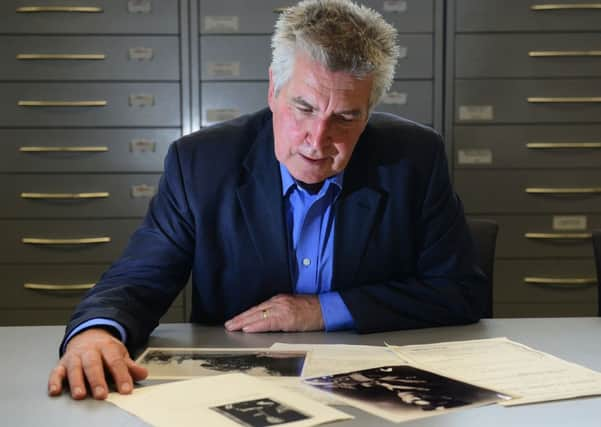The all-American war hero from Hull


WHEN the poet Rupert Brooke wrote about “some corner of a foreign field” that was “for ever England”, he was perhaps thinking more about Flanders than the United States.
Yet it is at Arlington National Cemetery, that nation’s most hallowed ground, which is the final resting place of Henry Lewis Hulbert – a US Marine who fought and died in the First World War.
Advertisement
Hide AdAdvertisement
Hide AdHe’s not alone – there are hundreds of thousands of graves at Arlington, Virginia, including soldiers who fought in the American Civil War. But what makes Hulbert different is that he came from Yorkshire.
His story is both astonishing and tragic and includes remarkable acts of bravery that made him one of the most highly decorated Marines of the Great War. It’s a story that could have easily been overlooked had it not been for Major Allan C Bevilacqua, himself a former Marine, who pieced together the strands of Hulbert’s life through various documents and letters that are now housed at the Hull History Centre.
Dr Robb Robinson, a historian and lecturer at the University of Hull, has long been fascinated by Hulbert’s remarkable journey from the streets of Hull to American war hero. “He was born in Spring Street in 1867 and he later lived down Cavendish Square, which still exists, and some of his family are buried in the General Cemetery in Hull,” he says.
His father was a successful merchant and Hulbert was sent to public school down south, returning regularly to visit his relatives in Hull. Then at the age of 17 he joined the British Colonial Service and was sent to the Straits Settlements – what is now Malaysia.
Advertisement
Hide AdAdvertisement
Hide AdWhile living in the Far East he met and married the daughter of a colonial official. “He maintained his links with Hull and came back to the city with his wife and stayed with his mother before heading back out to the Straits Settlements. His brother, in the meantime, rose up to be a captain in the Royal Navy, so they were doing all right for themselves.”
However, Hulbert’s world was thrown into turmoil when he had an affair with his wife’s sister. “This is colonial Britain in late Victorian times and their affair was discovered, which caused a big a scandal.”
His wife’s sister was sent back to Britain in disgrace, but tragedy struck when the ship carrying her sank off Aden and she drowned. Hulbert was devastated by the news and he, too, left the Far East. He travelled across the Pacific and joined the Klondike Gold Rush, working as an engineer, before travelling to San Francisco where he joined the US Marines in 1901.
“He’s then involved in every US Marines conflict right up to the Great War, he’s involved in fighting in the Philippines and Guantanamo Bay and he’s very well decorated. He becomes a Lord Jim-like figure who’s had this tragedy and is now trying to make up for it.”
Advertisement
Hide AdAdvertisement
Hide AdBy the time the United States entered the war in 1917 Gunner Hulbert was 50 years old, but rather than taking a desk job he insisted on being in the thick of the action. “He’s still incredibly fit and he’s on the front line and takes part in pretty much every major battle the Marines are involved in and he receives just about every military award you can think of.”
He became a platoon leader and quickly excelled. Wounded in his regiment’s first major engagement at Belleau Wood on June 6, 1918, Hulbert was twice cited for acts of bravery. On one occasion, armed only with a rifle, he single-handedly attacked German machine-gun positions. According to the official citation he “left seven of the enemy dead and put the remainder to flight”. In a second citation he was commended for continuing to lead his platoon in attacks against the enemy despite being wounded.
Hulbert, who was old enough to be the father of the men he led, always led by example and a third act of heroism earned him the Distinguished Service Cross, making him one of the first Marines to receive this honour.
“He was awarded a top award by General Pershing, commander of the American Expeditionary Force, for pulling the troops back together when they were overwhelmed during a German attack,” says Dr Robinson. “Pershing wanted to award the medal personally but Hulbert was on the other side of the river. Undaunted, he reportedly dived in and swam across the river and was presented with his medal while dripping wet.”
Advertisement
Hide AdAdvertisement
Hide AdBy the autumn of 1918 he had been promoted to captain but on October 4 he was killed by a German machine gunner during an attack at Blanc Mont Ridge, in France.
He died just a month before the war ended. He was posthumously awarded the Navy Cross, while the French government bestowed the Croix de Guerre Order of the Army upon this “most gallant soldier”.
But as Dr Robinson points out, the story doesn’t end there. “Two years later his body was disinterred and taken back to America where he was buried with honours in Arlington State Cemetery, and the Americans to this day award the Hulbert Trophy for outstanding leadership.”
Not only that but in 1919 the Americans built a warship which was named the USS Hulbert in honour of his exploits.
Advertisement
Hide AdAdvertisement
Hide AdThe destroyer was later used during the Second World War and was at Pearl Harbour when the Japanese attacked in 1941.
“It’s such a remarkable story. Here you have a leading Marine with trophies and ships named after him who is buried with honours, an all-American hero from the Great War – and he’s from Hull.”